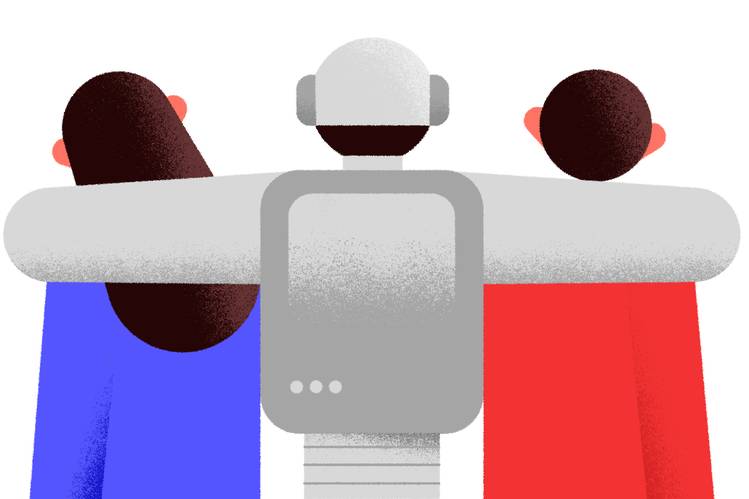Command Palette
Search for a command to run...
AI Can Predict When Couples Will Quarrel and Advise You to Calm Down

Quarrels are almost inevitable between couples and partners. Losing control of emotions during quarrels often causes harm to both parties, and even causes former lovers to part ways. Now, AI has learned to read people's expressions and help couples avoid quarrels. It can predict and stop quarrels before they break out, with a detection accuracy rate of 79.6%.
It is said that even couples who love each other will have the urge to divorce 100 times and strangle each other 50 times in their lifetime. Compared with love, marriage may be less romantic and sweet, but more trivial and bickering. Sometimes, two people who spend every day together may have a quarrel just because of a different way of squeezing toothpaste. "Family Wars".
Data shows that since 1990, the divorce rate in my country has increased significantly, and after 2000, the increase has stabilized at 5%~10%. Among them, many people have been exhausted physically and mentally in repeated quarrels, their relationships have gradually broken down, and finally choose to divorce.
Quarrels between couples are very stressful. Is there any way to avoid them?
The TV series "Chinese Divorce" aired in 2004 reflects the marriage status of middle-aged intellectuals in modern Chinese society.Lin Xiaofeng and Song Jianping often quarreled with each other, which led to the deepening of conflicts and the deterioration of their relationship, eventually leading to divorce..

Minor quarrels between husband and wife are not a big deal, but if they quarrel frequently, get angry, or even fight, it will eventually affect their relationship.How to avoid quarrelsThis is a question that many couples and partners want to find the perfect answer to. Therefore, we see a lot ofEmotional Expert,Emotional bloggerThese questions all came into being, and there is no shortage of such questions on Zhihu.

The Wrights, a famous American consultant, have studied marriage for 30 years and launched How to Argue ProperlyA book that summarizes 15 Common Types of Arguments, and teach couples how to become closer the more they argue. But is there really an answer to this question? I'm afraid even so-called relationship experts often find it difficult to give a perfect answer.
Perhaps the love forms of most couples in the world are similar, butThe quarrel patterns are differentSome like the cold war, some fight, some cry and make a fuss...
For different couples, the conflicts that cause quarrels are different, so the question of "how to avoid quarrels" has become an eternal problem.

However, if you use AI AlgorithmsHow will it be effective to deal with the problem of couples quarreling?
A team of four engineers and psychologists worked together to create AI Systems, the systemIt can predict the "war" that is about to break out between couples, with an accuracy rate of up to 79.6%Not only that, it can also mediate conflicts in a timely manner, and its effect may be better than that of human peacemakers.
With AI to mediate quarrels, couples will no longer quarrel
The AI system developed by these researchers can useVoice Modeand wearable devices, smartphonesphysiological,acousticsandLanguage data, to detect conflict between couples. The researchers believe that algorithms trained with this type of data canEventually it will be possible to predict conflicts and provide interventions before they escalate.
Theodora Chaspari, assistant professor of computer science and engineering at Texas A&M University, said:For example, a person who is highly stressed from an argument might receive a text message telling him or her that a fight is imminent and that he or she should pause the conversation and meditate for 10 minutes.
Previously, the team introduced a study in 2017 in which six researchers tracked 19 couples, these couples experienced conflict over the course of a single day.
The couple wore tracking devices such asHeart rate,Sweat,body temperature,Voice,andLanguage StrengthThe recordings were made every 12 minutes starting at 10 a.m. until the couples went to bed. Their smartphones prompted them to report their feelings once an hour and recorded the audio, thenAnalyzes audio for acoustic features such as pitch and frequency, as well as linguistic features such as the number of verbs and pronouns.

"The more couples used second-person pronouns, such as 'You didn't do the dishes,' the more likely they were to express anger, compared to 'I got frustrated when I saw the dishes in the sink,'" Dr. Chaspari said. Using the data collected, the researchers were able toThe algorithm was trained to detect conflicts with 79.6% accuracy.
The algorithm is able to identify “battles” in progress and predict specific patterns that could lead to arguments within minutes. “Detecting and monitoring this data in real time can interrupt, change or even prevent conflicts from happening,” Dr. Chaspari said.
There are two tricks to stop a fight with the computer
When couples quarrel, it is often difficult for relatives and friends to reconcile. How can computers achieve such success in helping couples avoid conflicts? Computers, which have no emotions, have the following two secrets.
Tip 1: Avoid defensiveness
Dr. Fjola Helgadottir, a clinical psychologist from Iceland, is AI Therapy (Artificial Intelligence for Therapy), an organization dedicated to developing automated AI programs to help people with social anxiety disorder.
Dr. Helgadottir said involving computers in couples therapy sessions could be helpful.A fair tip from the machine, which is more likely to be accepted and calming than having your partner tell you to calm down, which can cause a defensive reaction. So this is where the computer has the advantage that it doesn't make either party feel like the mediator is taking sides.

Computers are fair and just, and may be a good peacemaker.
Dr. Helgadottir also said that despite the limitations of self-reported data, the results of these efforts are promising.
Tip 2: Master the speed of speech and intonation
A new study published in October 2018 at the International Conference on Multimodal Interaction found that87 couples tracked, to understand how they experience conflict based on their marital satisfaction and attachment style.
Overall, the researchers found thatSpeed of speech and tone of voice are most important factors in detecting conflict in anxious and avoidant couplesThe team was therefore able to detect conflict in these couples using these two important factors and confirmed this by later speaking to them.86.9% accuracy.
However, for securely attached couples (those with lower anxiety and higher marital satisfaction), vocal, physiological, and linguistic variables were equally important.Tailoring interventions for specific types of couples.
AI has great potential to improve couples' relationships. Using artificial intelligence to detect conflicts between couples is part of the field of using AI to detect emotions.John Gottman, professor emeritus of psychology at the University of Washington, and his institute's co-founders, Dr. Gottman and his wife, Dr. Julie Gottman, say they use scientific research to help couples improve their relationships.See the potential of AI and other emerging technologies to help couples.
“Technology can help gauge what’s going on inside the couple as they talk,” says Julie Gottman. For example, she says, a couple who habitually expresses contempt and criticism might need to attend a therapy session to learn and practice new ways of communicating. A trained AI tool canIdentify these specific patterns, and track heart rate and other physiological indicators and make timely reports.
Looking ahead, Dr. Chaspari’s research group plans toUse less self-reported data and rely more on sensors in smartphones and fitness monitors“Although preliminary, the goal of our work is to create interventions that provide feedback and prompts to improve couples’ relationships and quality of life more broadly,” she said.Ultimately, our approach can also be extended to other domains, such as parent-child relationships."
Finally, I wish that all couples and lovers will have only sweet little quarrels.
-- over--